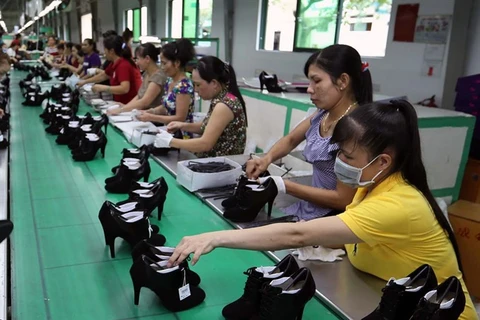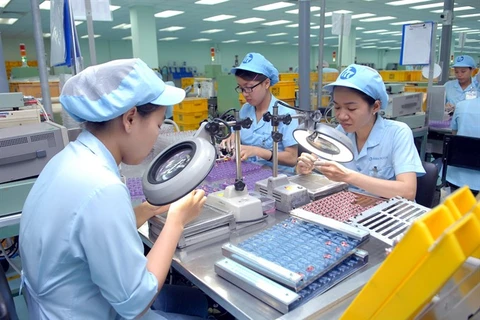 Workers line up at a canteen of a company in Tan Thuan Export Processing Zone in Ho Chi Minh City (Photo: VNA)
Workers line up at a canteen of a company in Tan Thuan Export Processing Zone in Ho Chi Minh City (Photo: VNA) HCM City (VNA) – Social dialogue and collective bargaining is the foundation for building harmonious labour relations in businesses, heard a workshop in Ho Chi Minh City on October 25.
The event was held by the Vietnam Chamber of Commerce and Industry and the Dutch Employers’ Cooperation Programme (DECP).
Nguyen Tat Nam, head of the labour, salary and wage division at the HCM City Department of Labour, Invalids and Social Affairs, said this city is home to the biggest numbers of businesses and workers in Vietnam. In the past, it had a huge number of strikes, which hurt business and investment attraction.
Since 2014, HCM City has carried out solutions to build harmonious labour relations and ensure the rights and interests of both employees and employers. Its labour confederation has worked to promote trade unions’ capacity, dialogue, negotiation and collective bargaining agreements.
Economic, cultural and social factors that influence labour relations have also been improved, including by building social housing and enhancing workers’ material and spiritual lives, Nam noted.
As a result, strikes in HCM City have been reduced, from 84 involving nearly 29,000 workers in 2015 to 53 with about 18,000 people in 2016, he added.
However, labour relations haven’t reached long-term stability and there are still risks of disputes and strikes, said Tran Hao Tri, deputy head of the labour management division at the HCM City Export Processing and Industrial Zone Authority.
He said that many companies haven’t complied with salary regulations or conferred with their employees before adjusting policies, and paid social insurance premiums late. Some of them haven’t paid attention to their employees’ daily life, working conditions and health. Up to 97 percent of enterprises are small and medium-sized and most haven’t set up trade unions.
Meanwhile, some labourers are still hesitant to voice their opinions at dialogues and workers’ meetings, which could accumulate strain and lead to strikes, Tri added.
Dirk Josse, a coordinator of the DECP’s labour relations development support programme, said labourers are the first and biggest asset of each business. Therefore, building harmonious labour relations helps companies develop sustainably.
Labour relations must be built based on dialogues and negotiations with mutual respect. Employers and employees need to have a good knowledge of law and bargaining skills so as to reach win-win agreements and create stable labour relations, he added.
Sharing her company’s experience, Tran Thi Kim Trang from the domestic affairs control division of the HCM City-based Freetrend company said the firm became operational in 1997 and encountered some strikes in the beginning.
However, the firm hasn’t had any strikes since 2011 thanks to the executive board’s talks with workers before making any decisions relating to their interests. Freetrend also established a division specialising in labour relations to facilitate communication between directors and employees.
If employers, trade unions and employees have mutual understanding, negotiations in solving disputes will be effective, thus minimising damage caused by strikes, she added.-VNA
VNA
























